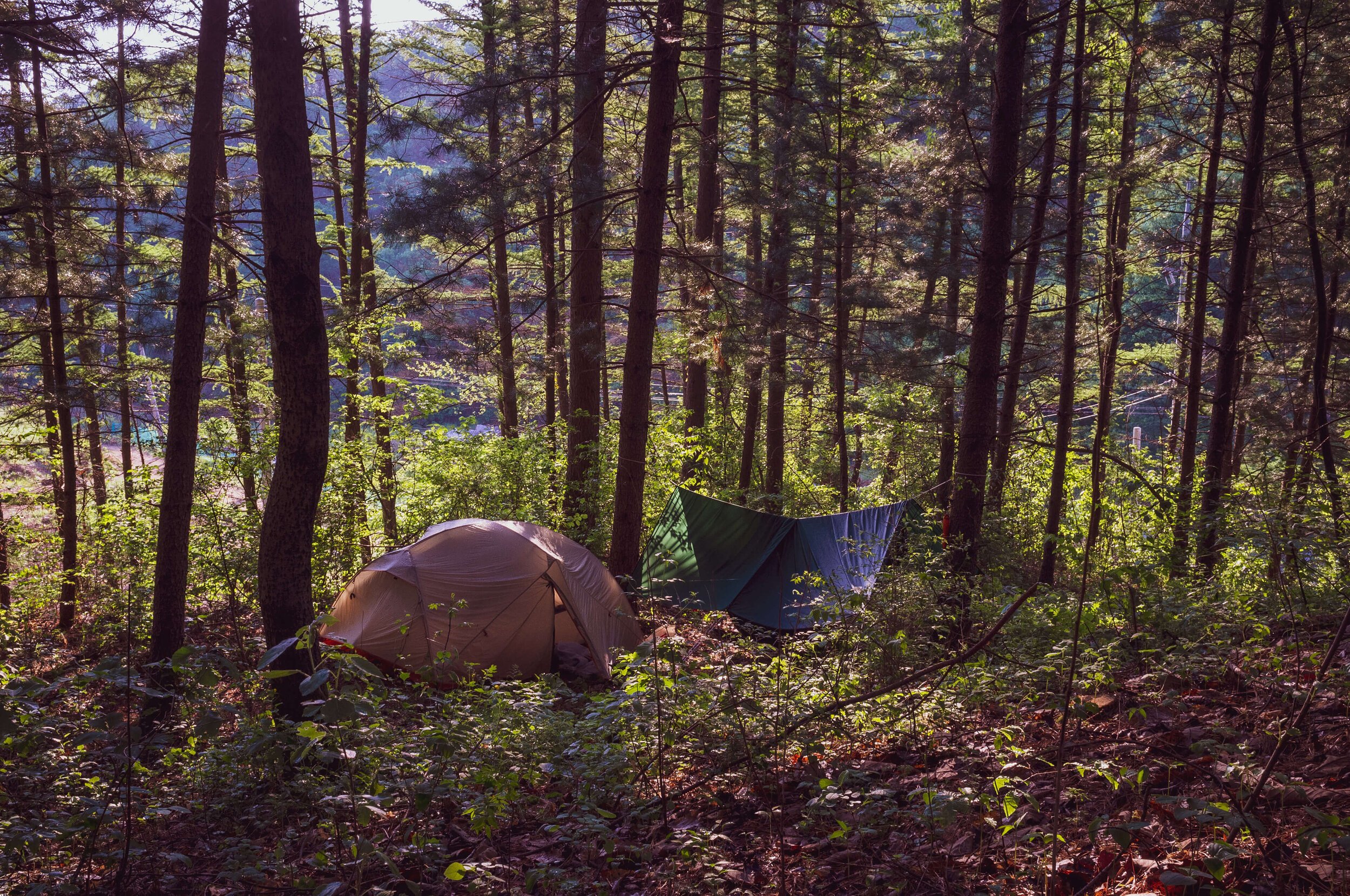5 Tips for Camping in South Korea
“I wanted a little of that swagger that comes with being able to gaze at a far horizon through eyes of chipped granite and say with a slow, manly sniff, “Yeah, I’ve shit in the woods.” - Bill Bryson
Korea is a great country for camping. This may come as a surprise as it's the 23rd most densely populated country in the world. It has an overall population density of 487 people to every square kilometer of land – this is ten times the global average. This tiny little country has very little use-able space - as a result, it's narrow valleys are crammed full with busy roads, farms, power-lines, rivers, houses, factories, golf-courses and villages. Luckily for wilderness lovers, it also happens to be covered in mostly low, but incredible steep and rugged mountains draped in dense forests. Whether you choose to explore by bike, car, foot or public transport, camping in Korea is an excellent option for relaxing and enjoying the natural environment. Here's how it works.
1. Commercial campsites are usually a block of land near a popular tourist attraction
If you’re hoping to commune with nature, you’ll definitely want to avoid commercial campsites during the peak summer holidays in late July and early August. They usually have a bunch of family sized tents already pitched that are available for hire. Sometimes they will also have a section of grass for people that want to set up their own tent. We find camping during this time too hot and humid anyway, so we usually stay in minbak or hotels during the Summer.
Explore Korea Like a Local With A Free Mini-Guide
Download your FREE guide and explore Korea beyond the usual tourist traps with a 3-day Seoul itinerary.
There is usually less than a meter between tents, they're often near major roads and you might find they have a PA system set up that plays Korean pop music until late in the evening. In terms of facilities, you can expect running water, toilets and some fairly basic shower facilities.
The good news is, when it’s not the summer vacation, commercial campsites are often empty. The PA will be turned off and the pre-erected tents are packed away. If it's still summer, the toilets will probably be open and the running water still on (don’t expect hot water though). As long as you’re not too close to a major road, you’ll have lots of grass, trees, peace and quiet all to yourself.
2. There are free, public campsites near many of the popular beaches and sprinkled throughout the countryside
Free public campsites along beaches usually consist of a grassy area above the high-tide mark. There's usually public toilets and running water nearby. During the busy season public campsites are ridiculously crowded and you can expect a lot of noisy neighbours talking loudly until the wee hours, pop-music played and fireworks being set off. During the summer, (but not peak-season) you’ll probably have a couple of neighbours and things should be peaceful enough to get a good nights sleep. You are allowed to set up camp on the sand at most quiet beaches during the spring, winter and autumn but during the summer you’ll probably be moved.
3. Wild camping in Korea is generally fine… as long as you're discreet and polite
All over South Korea in the summer, people set up tents next to rivers and in parks to spend the day enjoying the outdoors – reading, sleeping, riding bikes, swimming, picnicking and fishing. They don’t usually spend the night; it’s a daytime thing… but sometimes they do. Sometimes they drink too much and fall asleep, sometimes they want to leave their fishing line in the river all night and sometimes they just want to party into the early hours.
This is normal and acceptable – so for the bicycle tourist, this means that you can happily camp beside most rivers and beaches (and sometimes even in parks) without upsetting anybody. The trick is to not be noticed - camp like a day-tripper and you’ll avoid attracting attention.
The same goes for wild camping in the wilderness. If you're discreet and set up a simple camp, you'll probably be fine. Once we setup a campsite next to a small river near Daejeon, and unknown to us, it was the local's fishing area.
We had several visits in the morning and night by locals who were making sure we weren't lighting a campfire, littering or swimming in the river(!). They didn't want us scaring the fish. In this case, it would have been better to choose a more remote and less obvious campsite. Another more successful campsite was on the Seoul to Chuncheon bike ride where we chose to camp beside a little used hiking path on a small forested mountain. We had no visitors and a quiet - but chilly - sleep.
4. Be Responsible Camping in Korea
Don’t spread your camping gear (spare clothes, stove, bags of food, etc.) all over the ground if you're wild camping. This also makes it look like you are there for the long-haul which is not a great idea.
Don’t light a fire. This is not legal or socially acceptable and may get you a hefty fine as well as attracting the ire of the locals. Official campsites often have a BBQ setup where you can make a fire and cook.
Relieve yourself responsibly. Use public toilets if there are any around. If you’re in the remote countryside and there aren’t any, it’s generally okay to use the woods but make sure you bury it. Nobody likes to step on a pile of brown smeared tissues when they’re out for their morning walk. (Okay, you'll see this a lot in South Korea but try and be a good example to others!)
Follow these guidelines and you should be fine. I even know of people who have done this in a riverside park in the heart of South Korea’s capital city, Seoul. We have never had any trouble at all, but be aware that if you camp by a river and there are no other people around, there is a small chance somebody might not want you there. If this happens, smile a lot, be polite and move on.
5. The Summer weather...
In the summer, camping in Korea can be extremely humid, even at night. On one trip a few years ago, we set up our tent with the waterproof fly and spent the night sweltering and sweating inside our stuffy plastic cocoon.
On the next night of camping we decided to not use the fly, as it didn’t look like it was going to rain. That evening as we lay on our mats, the air cooled and the moisture in the air formed tiny droplets that began to fall gently; soaking us, our bedding, our clothes and everything else in our tent! After this experience we did some research and went out and bought some camping hammocks (with bug nets) and tarps – these work just perfectly as long as you can find a spot with trees to hang them in.
The hammock is fairly comfortable and allows you to feel the breeze; the bug net keeps out the mosquitoes while the tarp keeps off the falling moisture and the rain. Also, avoid cotton sleeping bag liners – they will soak up the moisture in the air and make you feel damp and sticky all night.
We've also spent some spring and summer nights freezing because we camped near mountains - the cold air poured down us overnight causing the temperature to dip down close to zero degrees Celcius!
Camping in Korea, particularly wild camping, can be a great way to experience South Korea's beautiful wilderness and is perfect for a slow travel adventure. However, it’s not for the faint hearted, as you never know what you’re going to experience!
Join our new Facebook group for more discussion about slow travel adventures in South Korea! If you are heading to Jeju Island, we also have an updated Jeju Island Slow Travel EBook so you can make the most of your trip.
Looking for hidden gems? Grab our free South Korea mini guide here.
Want more? Discover our Bali self-guided tours, Ballarat walking tours, and unique travel experiences at Hidden Lanes.
Curious about our signature tour packages? Explore our 3-day slow travel experiences in Ballarat, Australia – start your journey here.
Start your own slow travel journey: check out our free mini guides and paid guides here.







